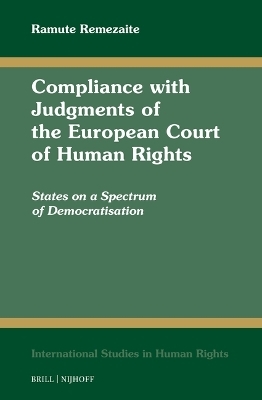
Compliance with Judgments of the European Court of Human Rights
Martinus Nijhoff (Verlag)
978-90-04-53820-7 (ISBN)
Dr. Ramute Remezaite obtained her PhD from the School of Law, Middlesex University in 2021. She currently works as a Senior Legal Consultant and Implementation Lead at the European Human Rights Advocacy Centre based in the School of Law, Middlesex University where she litigates human rights cases before the ECtHR and advocates for their implementation.
Acknowledgments
List of Figures
1 Introduction
1.1 Background and Problem Statement
1.2 Key Aims and Research Questions of the Book
1.3 Research Methodology
1.3.1 Country and Case Selection
1.3.2 Research Methods
1.3.3 Structure of the Book
2 Defining Compliance
2.1 Defining and Measuring Compliance
2.2 Compliance Theories
2.2.1 Causality between Human Rights Judgments and States’ Behavior
2.3 Modalities of Implementation in the Council of Europe System
2.3.1 Scope and Procedure of cm Supervision
2.3.2 Involvement of other Actors in the cm Supervision Process
3 Azerbaijan The New Achilles Heel of the Council of Europe?
3.1 Azerbaijan and CoE
3.1.1 Azerbaijan’s Accession to the CoE
3.2 Azerbaijan’s Compliance with ECtHR Judgments
3.2.1 Azerbaijan and the Court
3.2.2 Domestic Implementation System: One Man’s Land
3.2.2.1 Dual Role of the Agent’s Office
3.2.2.2 Allocation of Resources
3.2.2.3 Absence of Formal Procedures for Coordination and Involvement in the Process
3.2.2.4 Absence of Information and Public Scrutiny
3.2.3 Systematic Failure of ‘Good Faith’ Engagement with the cm
3.2.3.1 Triggers for Government’s Engagement with the cm Supervision Process
3.2.3.2 What Systemic Change on the Ground?
3.2.4 Explaining Azerbaijan’s Absence of Good Faith
3.2.5 Adequacy of the Response of the cm and the CoE to Azerbaijan’s Acting in Bad Faith
3.2.6 Why Does Azerbaijan Remain in the CoE?
3.3 Conclusion
4 Armenia’s Compliance with Judgments of the European Court of Human Rights A Litmus Test for the Council of Europe?
4.1 Armenia and CoE: Historical and Contextual Setting
4.1.1 Armenia and the ECtHR
4.2 Armenia’s Compliance with ECtHR Judgments
4.2.1 Domestic Implementation System
4.2.2 Armenia’s Compliance with ECtHR Judgments: Good Practices and Challenges
4.2.2.1 Factors Defining Compliance with ECtHR Judgments
4.3 Strasbourg’s Contributions to Compliance with ECtHR Judgments in Armenia
4.3.1 cm’s Engagement with the Supervision of Armenian Cases
4.3.2 Contributions of other CoE Bodies and Domestic Actors to Compliance
4.4 Conclusion
5 Georgia as Council of Europe’s Success Story in the South Caucasus
5.1 Georgia’s Accession and Its Membership in the Council of Europe
5.1.1 Georgia and the ECtHR
5.2 National System for the Implementation of ECtHR Judgments in Georgia
5.2.1 Absence of Strong Culture of Accountability, and Politicization of the Process
5.2.2 Insufficient Access to Information on the Implementation Process
5.3 Georgia’s Compliance with ECtHR Judgments
5.3.1 Georgia’s Engagement with the cm Supervision Process
5.3.2 Domestic Factors Shaping Georgia’s Engagement with Strasbourg Processes
5.3.2.1 Political Willingness as an Underlying Factor for Compliance
5.3.2.2 Intrusion of ‘Traditional’ Values and Pervasive Discrimination as a Complex Political and Societal Issue
5.3.2.3 ‘External’ Support to Compliance with ECtHR Judgments
5.4 Conclusion
6 Challenging the Unconditional Obligation Partial Compliance with ECtHR Judgments in the South Caucasus States
6.1 What Is Partial Compliance?
6.2 Forms of Partial Compliance
6.2.1 Minimalistic Compliance
6.2.2 Dilatory Compliance
6.2.3 Contested Compliance
6.3 Identifying Partial Compliance in the South Caucasus States: Methodological Considerations
6.3.1 Prescriptiveness of Judgments
6.3.2 Length of Time
6.3.3 Engagement with the cm Process
6.3.4 Diversification of Sources of Information
6.4 Explaining Partial Compliance in the South Caucasus States
6.4.1 Complexity of Human Rights Issues
6.4.2 Domestic Political Climate: International Reputation versus Domestic Interests
6.4.3 Effectiveness of Domestic Infrastructure for Compliance with ECtHR Judgments
6.5 Conclusions
7 Beyond Compliance Identifying Impact of European Court Judgments in the South Caucasus States
7.1 Concept of Impact of ECtHR Judgments in the South Caucasus States
7.2 Typologies of Impact
7.2.1 Material Impact on Individual Victims
7.2.2 Moral Impact on Individual Victims
7.2.3 Documentation and Exposure of States’ Human Rights Abuses
7.2.4 Wider Legal and Policy Impact of ECtHR Judgments
7.2.5 Mobilization of Civil Society Groups and National Human Rights Institutions
7.3 Conclusion
8 Conclusions
Appendix
Bibliography
Index
| Erscheinungsdatum | 28.10.2023 |
|---|---|
| Reihe/Serie | International Studies in Human Rights ; 143 |
| Sprache | englisch |
| Maße | 155 x 235 mm |
| Gewicht | 613 g |
| Themenwelt | Recht / Steuern ► EU / Internationales Recht |
| Recht / Steuern ► Öffentliches Recht ► Völkerrecht | |
| ISBN-10 | 90-04-53820-8 / 9004538208 |
| ISBN-13 | 978-90-04-53820-7 / 9789004538207 |
| Zustand | Neuware |
| Haben Sie eine Frage zum Produkt? |
aus dem Bereich


